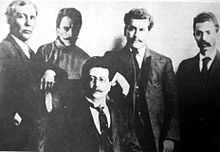Mexican Liberal Party Partido Liberal Mexicano | |
|---|---|
 | |
| President | Ricardo Flores Magón |
| Vice President | Juan Sarabia (1905–1911) |
| Founded | 28 September 1905[1][2] |
| Dissolved | 1918 |
| Split from | Liberal Party |
| Headquarters | Mexico City |
| Newspaper | Regeneración |
| Ideology | Magonism[3] Radicalism[4][5] Jacobinism[6] Anarcho-syndicalism[7] |
| Political position | Far-left |
| Colours | Red Black |
| Party flag | |
 | |
| Part of a series on |
| Radicalism |
|---|
 |


The Mexican Liberal Party (Spanish: Partido Liberal Mexicano, PLM) was founded in August 1900 when engineer Camilo Arriaga published a manifesto entitled Invitacion al Partido Liberal (Invitation to the Liberal Party). The invitation was addressed to Mexican liberals who were dissatisfied with the way the government of Porfirio Díaz was deviating from the liberal Constitution of 1857.[8] Arriaga called on Mexican liberals to form local liberal clubs, which would then send delegates to a liberal convention.[9]
The first Mexican Liberal Party Convention was held in San Luis Potosí in February 1901. Fifty local clubs from thirteen states sent 56 delegates.[10] The Convention delegates affirmed their liberal beliefs in free speech, free press, and free assembly. They objected to the close workings of the Diaz government and the Catholic Church.[11] The convention produced fifty-one resolutions which called for the organization of the new Liberal Party, propagation of liberal principles, development of means to combat the political influence of the clergy, establishment of means to improve the administration of justice, proposals calling for guarantees of the rights of citizens and real freedom of the press, and proposals favoring complete self-government at the local level. They also called for support for free secular education in the primary schools, the spread of liberal ideas among the lower classes, the establishment of liberal publications, and the taxation of Church income.[12]
Ricardo Flores Magón attended the first Convention as a reporter for his newspaper Regeneración ("Regeneration"). He afterwards published an editorial in favorable support of the aims and aspirations. In April 1901, the new Mexican Liberal Party opened a branch in Mexico City, and Ricardo Flores Magón and his brothers joined and became active members. Always a bit more radical than most members, Flores Magón was forced into exile in January 1904. Finally settling in San Antonio, Texas, Flores Magón called for radical members of the Liberal Party to follow him in a new organization. In September 1905, the radical liberals, led by Flores Magón, formed a new organization called Junta Organizadora del Partido Liberal Mexicano (PLM). This organization would be separate from the Liberal Party, and it would seek to coordinate the violent overthrow of the Díaz government.[13] The PLM was involved in strikes and uprisings in Mexico from 1906 to 1911.
- ^ Ricardo Flores Magón – El Apóstol cautivo, tomo I, cap. 9 – El Partido Liberal Mexicano Archived 17 June 2013 at the Wayback Machine [Currently not working, use the reference below] Government of Mexico (in Spanish)
- ^ Ricardo Flores Magón – El Apóstol cautivo, tomo I, cap. 9, pg. 166 – El Partido Liberal Mexicano Library of the Department of Historic Investigations (in Spanish)
- ^ Hodges, Donald C. (2010). Mexican Anarchism after the Revolution. University of Texas Press. p. 49. ISBN 978-0-292-78875-6.
- ^ Bosque Lastra, Margarita (1997). La constitución de hoy y su protección hacia el siglo XXI. Universidad Nacional Autónoma de México. p. 132.
- ^ Suárez Cortina, Manuel (2013). Cuestión religiosa España y México en la época liberal. Ediciones Universidad Cantabria. pp. 218–219.
- ^ Córdova, Arnaldo (1973). La ideología de la Revolución Mexicana la formación del nuevo régimen. Ediciones Era. p. 122.
- ^ Buchenau, Jürgen (3 September 2015). "The Mexican Revolution, 1910–1946". Latin American History: 2. doi:10.1093/acrefore/9780199366439.013.21. ISBN 978-0-19-936643-9.
- ^ Ward Albro, "Always a Rebel" 1992, p8
- ^ Ward Albro, "Always a Rebel" 1992, p10
- ^ Ward Albro, "Always a Rebel" 1992, p10
- ^ Ward Albro, "Always a Rebel" 1992, p8
- ^ Ward Albro, "Always a Rebel" 1992, p13
- ^ Ward Albro, "Always a Rebel" 1992, p30